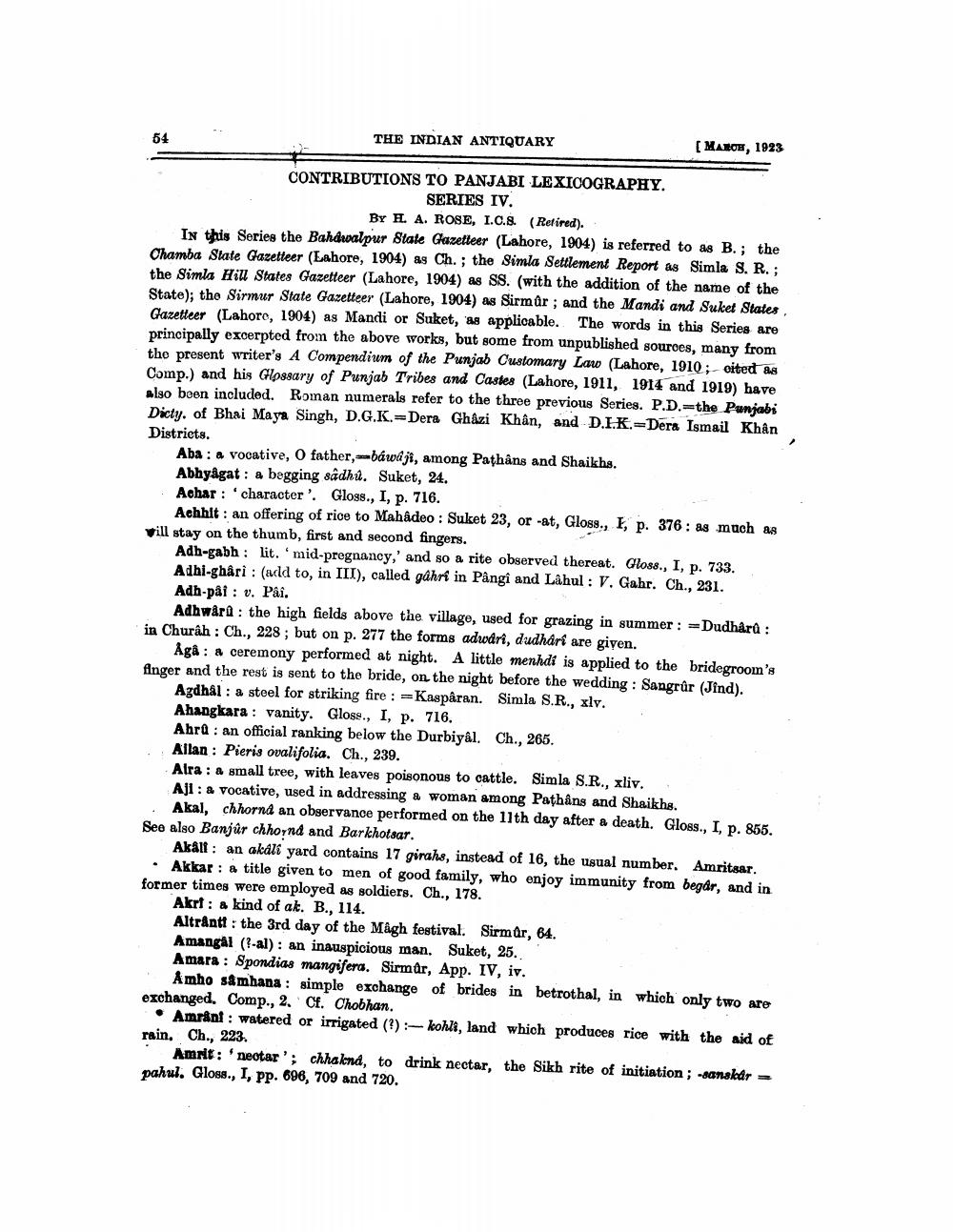________________
THE INDIAN ANTIQUARY
[MAECE, 1923
CONTRIBUTIONS TO PANJABI LEXICOGRAPHY.
SERIES IV.
BY H. A. ROSE, I.C.S. (Retired). In this Series the Bahdwalpur State Gazetteer (Lahore, 1904) is referred to as B.; the Chamba State Gazetteer (Lahore, 1904) as Ch.; the Simla Settlement Report as Simla S. R.; the Simla Hill States Gazetteer (Lahore, 1904) as SS. (with the addition of the name of the State); tho Sirmur State Gazetteer (Lahore, 1904) as Sirmûr; and the Mandi and Suket States Gazetteer (Lahore, 1904) as Mandi or Suket, as applicable. The words in this Series are principally excerpted from the above works, but some from unpublished sources, many from the present writer's A Compendium of the Punjab Customary Law (Lahore, 1910 ;- cited as Comp.) and his Glossary of Punjab Tribes and Castes (Lahore, 1911, 1914 and 1919) have also boen included. Roman numerals refer to the three previous Series. P.D.-the Punjabi Dictu. of Bhai Maya Singh, D.G.K. Dera Ghazi Khân, and D.I.K. -Dera Ismail Khân Districts.
Aba : a vocative, O father, -báwaji, among Pathans and Shaikhs.
Abhyagat: a begging sâdhu. Suket, 24. · Achar : character'. Gloss., I, p. 716.
Achhlt: an offering of rice to Mahâdeo : Suket 23, or -at, Gloss., I, p. 376 : as much as vill stay on the thumb, first and second fingers.
Adh-gabh : lit. 'mid-pregnancy,' and so a rite observed thereat. Chloss., I, p. 733. Adhi-ghari : add to, in III), called gâhri in Pangi and Lahul: V. Gahr. Ch., 231. Adh-pai: v. Pai.
Adhwara: the high fields above the village, used for grazing in summer : Dudharú : in Churâh : Ch., 228 ; but on p. 277 the forms adwdri, dudhari are given.
Ågå : * ceremony performed at night. A little menhdi is applied to the bridegroom's Anger and the rest is sent to the bride, on the night before the wedding : Sangrûr (Jind).
Agdhál: a steel for striking fire :=Kasparan. Simla S.R., xlv. Ahangkara : vanity. Glose., I, p. 716. Ahra : an official ranking below the Durbiyal. Ch., 265. Allan : Pieris ovalifolia. Ch., 239. Alra : a small tree, with leaves poisonous to cattle. Simla S.R., xliv. AJI : a vocative, used in addressing a woman among Pathans and Shaikhs.
Akal, chhornd an observance performed on the 17th day after a death. Gloss., I. p. 855. See also Banjûr chhond and Barkhotsar.
Akall : an akáll yard contains 17 girahs, instead of 16, the usual number. Amritsar. • Akkar: a title given to men of good family, who enjoy immunity from begår, and in former times were employed as soldiers. Ch., 178.
Akrt: a kind of ak. B., 114. Alträntt: the 3rd day of the Magh festival. Sirmar, 64. Amangal (?-al): an inauspicious man, Suket, 25. Amara : Spondias mangifera. Sirmar, App. IV, iv.
Amho sâmhana: simple exchange of brides in betrothal, in which only two are exchanged. Comp., 2. Cf. Chobhan.
• Amran : watered or irrigated (?) :kohli, land which produces rice with the aid of rain. Ch., 223.
Amrit: 'neotar'; chhaknd, to drink nectar, the Sikh rite of initiation ; sanskar - pahul. Gloss., I, pp. 696, 709 and 720.




